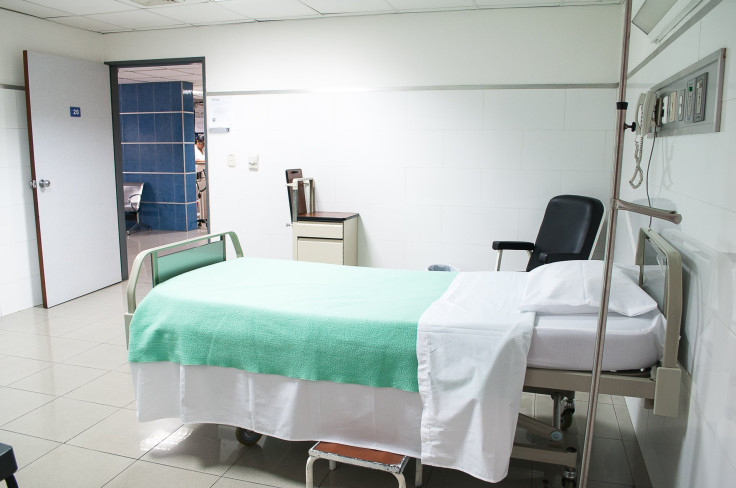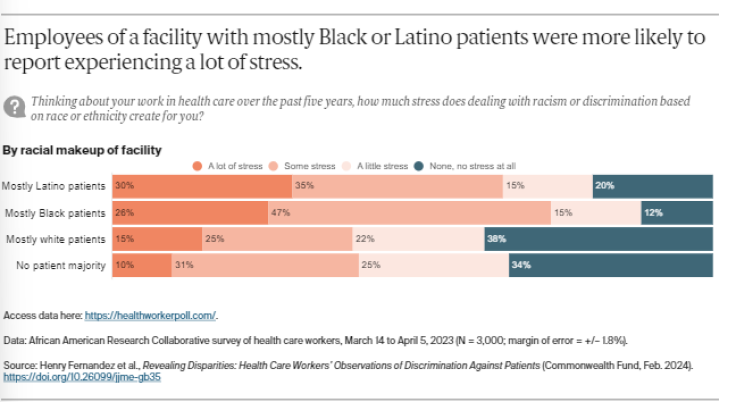
A majority of Latino healthcare workers have seen racial or ethnic discrimination in their workplace and consider the issue to be a crisis or a major problem, according to a new survey by the Commonwealth Fund.
The survey showed that Latinos and Blacks were more likely to consider this a problem than Asian-American and White counterparts. Overall, 26% of Latino respondents called it a crisis and 34% a major problem but not a crisis, making them the second-most worried demographic behind Blacks.
Asked whether they had witnessed events of this nature themselves, 58% of Latinos said they had, the second largest figure among all demographics surveyed. Blacks topped the list with 62%, while Whites were at the other end of the spectrum with 42%. The average figure was 47%.
"The likelihood of a worker witnessing discrimination is correlated with the racial makeup of patients at a health care facility. Employees of a facility with mostly Black or Latino patients reported witnessing discrimination at higher rates than those at facilities where most patients are white or where no race is a majority," reads a passage of the report.
Moreover, a majority of all healthcare workers agreed with the premise that "patients who mostly speak Spanish, Chinese, Tagalog, Vietnamese, Creole, or other languages aside from English may not always receive equal quality treatment from health care providers compared to English-speaking patients" The figure climbed to 72% when Latino healthcare workers were asked the same question.
Latino workers were the most gravely stressed by situations of racial or ethnic discrimination: overall, almost two thirds said they feel a lot of stress (27%) or some stress (36%). 17% said they feel a little stress and 21% no stress at all. 65% of Latinos said they feel a lot or some stress in facilities with mostly Black or Latino patients.

"This should be concerning to medical schools, nursing schools, and hospitals trying to diversify the health care workforce. A recent study found that health care workers who witness racism by other clinical staff often lack options allowing them to discuss and report such experiences," said the survey about the situation.
The perception of the problem's scale also varies based on age, the patients workers interact with and their geographical location.
When it comes to age, respondents aged 18 to 39 were much more likely to consider this a problem than their older counterparts. Two thirds of the former said this was the case, with figures dropping as age increased. One third of those aged 60 and older said racism was a crisis (8%) or a major problem (25%).
As for patient interaction, mental health care workers were more likely to say racism was an issue of magnitude (68%) compared to to all health care workers (52%). And when it comes to geographical location, community-based health care facilities like health centers or school clinics workers were more likely to have this opinion compared to long-term care facilities, outpatient ones and hospitals.
Moreover, "79% of health care workers in facilities with majority-Black patients and 66% working in facilities with majority-Latino patients said discrimination based on race or ethnicity is a crisis or major problem. This compares to 52% for health care workers in facilities with majority-white patients and 47% for facilities with no majority racial or ethnic group," the report adds.
Talking about potential ways to address the issue, the report says that "leaders and policymakers have the responsibility to create safer and more equitable care settings for patients and the people caring for them."
On that note, they make six proposals: Provide an easy way for patients and health care staff to anonymously report situations involving racism or discrimination; Examine policies to be sure they result in equitable outcomes; Require classes on discrimination at professional schools; Create opportunities to listen to patients of color and health care professionals of color; Examine treatment of non-English-speaking patients; and Train health care staff to spot discrimination.
"They can be initial steps in addressing discrimination in health systems, with knowledge that they will be generally seen as worthwhile by a solid majority of the workforce," the study concludes.
© 2024 Latin Times. All rights reserved. Do not reproduce without permission.







